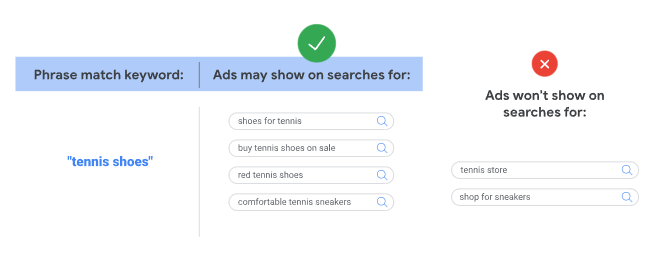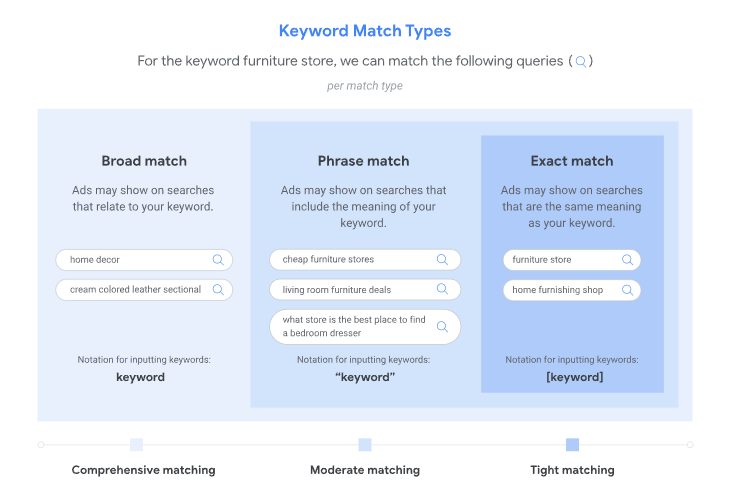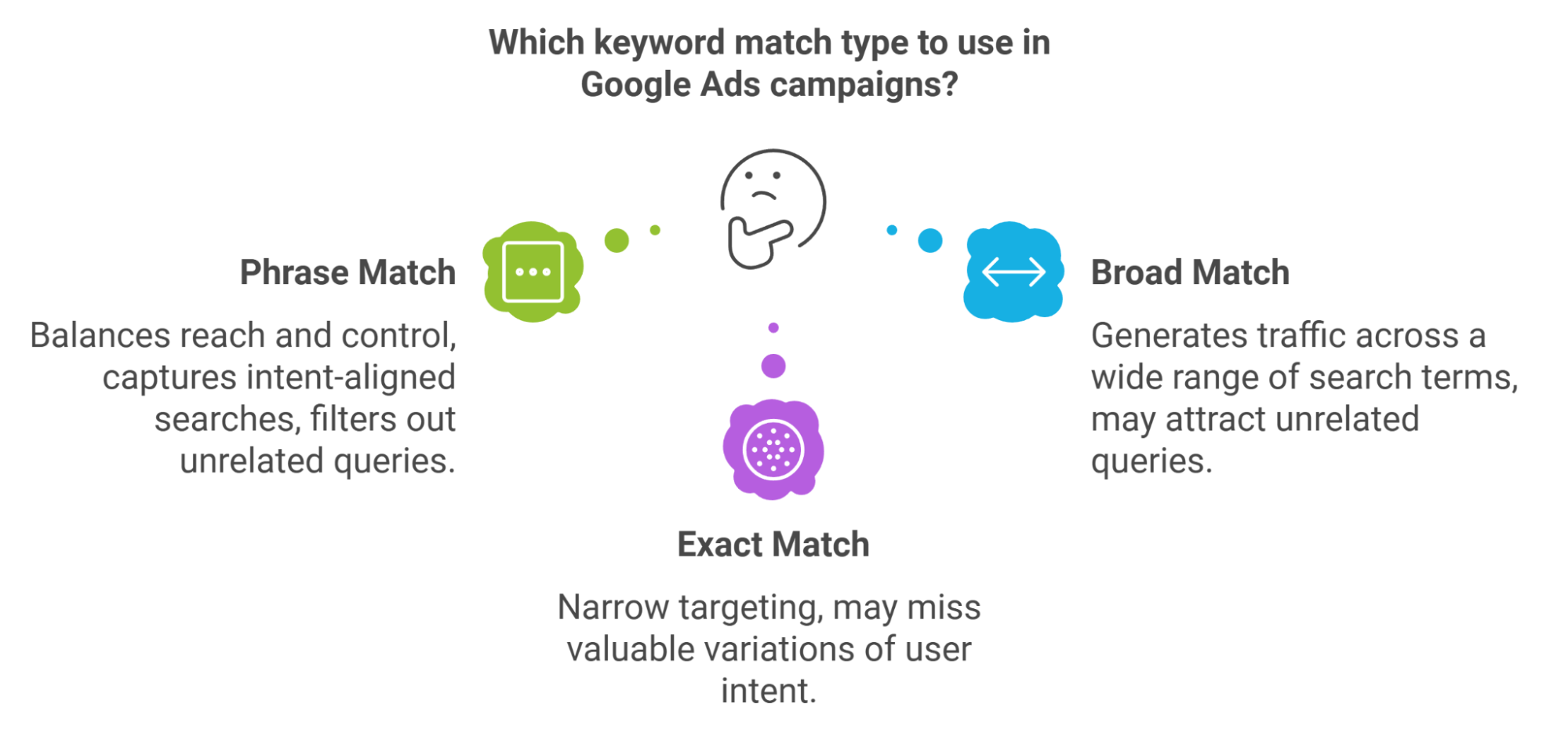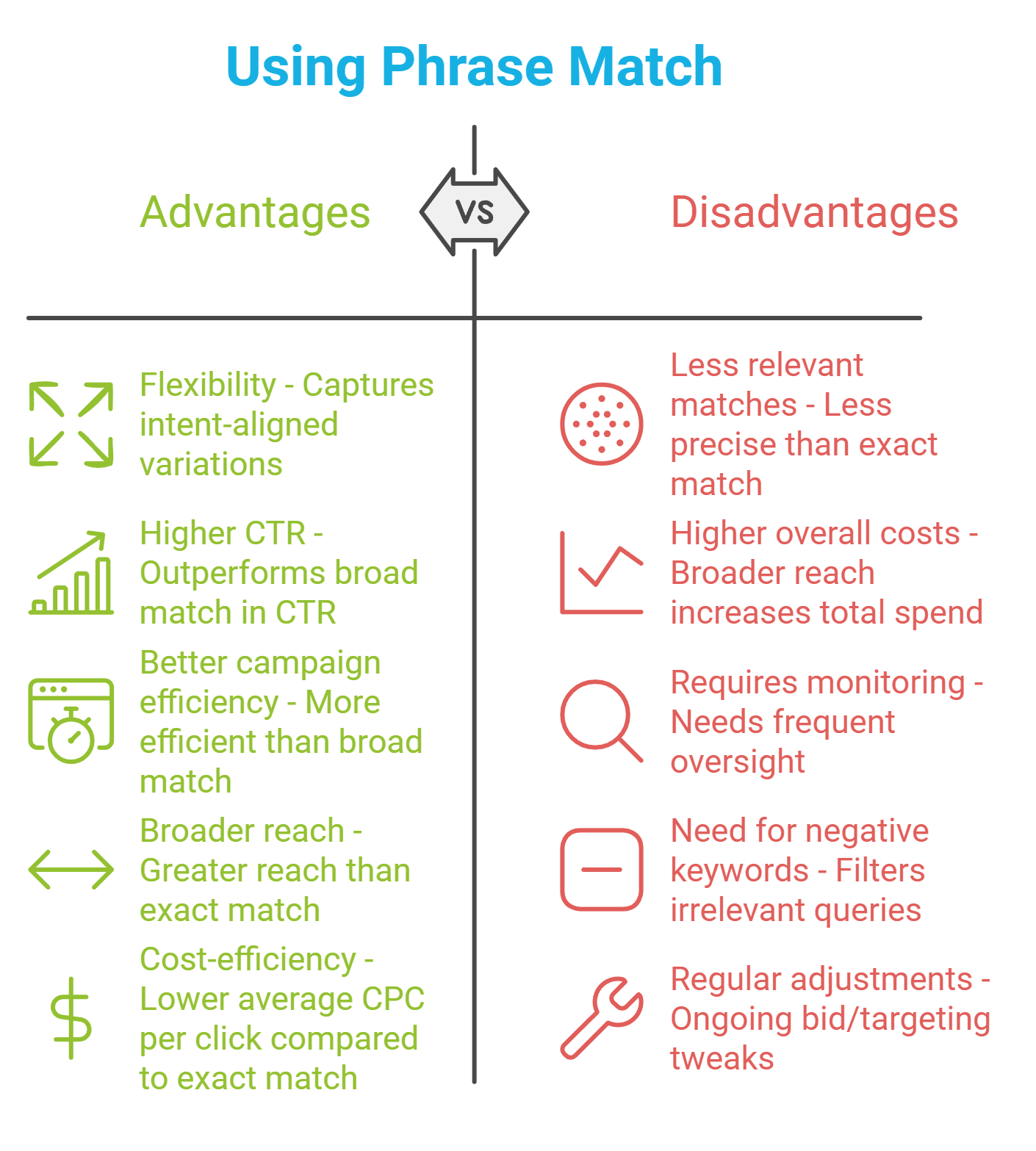Google has continued evolving its ad targeting systems, emphasizing AI-driven, intent-based matching that connects ads to user searches more flexibly.
With this shift, Google Ads aims to give advertisers a balance between reach and control – where phrase match keywords can now capture broader, intent-aligned search terms.
Recent updates focus on “relevant variations” of search terms, leaning heavily on Smart Bidding to provide cost-effective results while allowing AI to show ads for a broader set of queries that match the user’s intent rather than specific words.
Phrase Match Examples
Phrase match’s looser definition introduced in 2024 means ads can appear for broader, intent-aligned queries rather than just queries that contain the same words as the keyword.
For example, a keyword like “eco-friendly cleaning supplies” may trigger ads for searches like [sustainable cleaning products] or [green cleaning solutions].
While these queries don’t have the same words as the keyword, which phrase match used to require, Google’s AI judges these variations as relevant, offering broader reach without sacrificing quality.
User Insight: To analyze phrase match performance, monitor Google’s enhanced search term reporting, updated in June 2024.
With this update, Google improved visibility by including misspelled search queries alongside their correct counterparts, revealing approximately 9% more search terms that were previously categorized as “Other.”
This additional visibility allows you to identify trends better and spot irrelevant terms, providing more data to refine your campaigns for optimal results.
What Is Phrase Match In Google Ads?
 Image from author, November 2024
Image from author, November 2024Phrase match traditionally required ads to appear only for searches containing the keyword phrase in the exact order.
However, with Google’s transition to intent-based matching, ads can now appear for searches that align with the advertiser’s keyword intent, even if the phrase order or specific wording differs.
This means that ads may show on searches that include the meaning of the keyword, even if that meaning is implied or if the user’s search is a more specific form of it.
Example of Phrase Match Flexibility: Suppose your phrase match keyword is “tennis shoes.” With 2024’s updates, this keyword could trigger ads for searches like [men’s tennis sneakers] or [women’s sports shoes for tennis].
Although the words aren’t identical, Google’s AI recognizes that they share a similar intent, allowing advertisers to capture more relevant clicks within this broadened scope.
This approach enables advertisers to reach a wider audience than with an exact match but still maintains more control than broad match.
The syntax for phrase match remains the same – by placing quotes around the keyword, such as “tennis shoes,” advertisers signal Google to match ads to relevant variations of the keyword’s meaning.
This intent-based system ensures ads appear only on searches that closely relate to the product or service, giving advertisers the reach they need without diluting relevance.
New Brand Controls And Thematic Targeting In Phrase Match
Phrase match now prioritizes search intent over strict keyword matching, using Google’s AI to focus on relevance rather than exact phrasing.
This shift enables phrase match to capture a broader range of intent-aligned queries, making thematic keyword grouping a strategic approach.
Organizing keywords by theme allows advertisers to better manage reach and relevance within ad groups.
For instance, if you’re promoting fitness leggings, a thematic ad group could include terms like “workout leggings,” “athletic leggings,” and “high-performance gym tights.”
This approach ensures your ads reach intent-aligned searches across a focused product theme, achieving both precision and broader coverage.
The June 2024 update also introduced expanded brand controls that enhance targeting flexibility, allowing advertisers to better manage ad placements with two new tools: brand exclusions and brand inclusions.
Brand Exclusions
This setting allows you to prevent ads from appearing on specific brand-related search queries that don’t align with campaign goals.
It’s useful for filtering out irrelevant brand terms, misspellings, or close brand variants and is applicable across all match types and Dynamic Search Ads (DSAs).
By using brand exclusions, you can maintain ad relevance and ensure that impressions focus only on relevant traffic.
Brand Inclusions
Specific to broad match, brand inclusions allow ads to appear only on queries associated with selected brands.
This is useful if you want broad match reach but with more brand-specific targeting, helping you avoid unwanted brand associations while benefiting from broad match’s potential for higher reach.
Together, these brand controls offer advertisers more refined management over ad placements, which is especially helpful as phrase match broadens to capture more thematic intent.
However, it’s essential to monitor the impact of brand exclusions on reach and conversion rates.
Regularly review and adjust brand settings to optimize reach while maintaining ad quality and relevance.
Phrase Match Vs. Other Match Types
 Image from author, November 2024
Image from author, November 2024Phrase match stands distinct from exact and broad match types by offering a balanced middle ground between controlled targeting and reach.
Exact match remains the best option for high-precision campaigns, ensuring ads only appear for searches that closely match the target keyword.
Broad match, on the other hand, is often used in conjunction with Smart Bidding and Responsive Search Ads to allow Google’s AI to find additional conversions within bid targets, even when the keywords may be less directly related to the advertiser’s core terms.
For advertisers who want to balance control with reach, phrase match continues to provide a reliable option that blends intent-focused targeting with a reasonable scope.
Broad match can be beneficial when aiming for conversions at lower costs through Google’s automated relevance, though it requires careful monitoring to avoid potential misalignment with the brand’s focus.
As we compare these match types, recent performance data offers further insight into how each one delivers value in specific areas.
Optmyzr’s November 2024 analysis provides a deeper look at key metrics across exact, phrase, and broad match keywords, highlighting unique advantages that can guide strategic choices.
Performance Analysis Of Match Types
Strategic Data: Optmyzr’s November 2024 analysis of 992,028 keywords across 15,491 ad accounts highlights the unique strengths of each match type:
- Exact Match: Delivers the highest precision with the highest ROAS (415%) and CTR (21.6%).
- Phrase Match: Offers balanced reach, with the second-highest ROAS (314%) and CTR (11.4%).
- Broad Match: Maximizes cost-effective volume, with the lowest ROAS (278%) and CTR (8.5%) but the highest conversion rate (8.52%).
Among the nearly one million keywords analyzed, 36% were phrase match, 33% were exact match, and 31% were broad match.
| Match Type | No. of accounts | No. of campaigns | No. of keywords | Conv. rate | ROAS | CPC | CPA | CTR |
| Exact | 12,936 | 57,219 | 332,343 | 7.98% | 415.33% | 1.40 | 17.59 | 21.66% |
| Phrase | 15,491 | 69,592 | 353,050 | 9.31% | 313.17% | 1.71 | 18.33 | 11.36% |
| Broad | 12,760 | 48,599 | 306,635 | 8.52% | 277.71% | 1.81 | 21.29 | 8.53% |
Source: Optmyzr Keyword Study – November 2024
Advantages Of Using Phrase Match
 Image from author, November 2024
Image from author, November 2024Why Choose Phrase Match Over Exact and Broad Match?
With recent updates, phrase match now captures intent-aligned searches similarly to broad match, raising the question of why advertisers would still opt for it instead of relying solely on broad and exact match.
The reason lies in phrase match’s ability to deliver relevant reach with more control than broad match can offer.
While broad match can generate traffic across a wide range of search terms, it may attract some unrelated queries, even with Smart Bidding adjustments.
Phrase match offers a balance, allowing ads to reach more intent-aligned searches while filtering out terms that stray too far from the specific theme of the keyword.
This makes phrase match particularly valuable in campaigns where maintaining relevance within a competitive market is key but where exact match’s narrow targeting may miss valuable variations of user intent.
 Image from author, November 2024
Image from author, November 2024Advantages Of Using Phrase Match
Phrase match remains a highly effective tool, offering advertisers the flexibility to capture a range of relevant queries while maintaining a degree of control beyond what broad match provides.
Google’s AI updates enable phrase match to work seamlessly with Smart Bidding, aligning ads more accurately with intent-aligned queries, which can lead to higher click-through rates and better campaign efficiency.
These updates make it possible for phrase match to achieve a broader reach while still focusing on relevance, capturing queries close to the product or service theme.
For advertisers seeking a balance between reach and cost-efficiency, phrase match stands out as ideal – especially in competitive markets where control over search intent can help maximize ad relevance and minimize wasted spend.
Disadvantages Of Using Phrase Match
Phrase match, while flexible, carries some potential drawbacks.
The broad reach might lead to less relevant matches, which can result in increased costs if not monitored carefully. Negative keywords, brand exclusions, and regular adjustments are essential to keep your campaigns targeted and cost-effective.
Pro Tip: Brand exclusions, combined with a vigilant approach to monitoring search terms, can help avoid irrelevant clicks. Be cautious with overly generic phrase match keywords that may trigger less relevant ads, leading to wasted ad spend.
When To Use Phrase Match In Your PPC Campaigns
Phrase match is ideal for capturing a range of related searches without segmenting the campaign too narrowly.
Using thematic keyword groupings can help improve campaign efficiency, as Google’s systems now recognize broader but intent-aligned variations.
Pairing broad match with phrase match can be effective, especially for large-scale campaigns.
Broad match, when combined with Smart Bidding, can help identify new opportunities, while phrase match ensures the ad stays relevant to a specific theme.
Phrase Match Tips For Success
To enhance the effectiveness of phrase match keywords in your campaigns, consider implementing the following advanced strategies:
1. Leverage Thematic Ad Group Structuring
Organize your ad groups around specific themes or product categories. This approach ensures that your ads are triggered by search queries closely aligned with user intent, thereby improving ad relevance and performance.
For instance, grouping keywords like “eco-friendly cleaning supplies” and “sustainable cleaning products” within the same ad group can help target environmentally conscious consumers more effectively.
2. Implement Advanced Negative Keyword Strategies
Regularly update and refine your negative keyword list to exclude terms that are irrelevant or unlikely to convert.
This practice prevents your ads from appearing in unrelated searches, optimizing your budget and enhancing click-through rates.
For example, if you’re selling premium products, adding “cheap” or “discount” as negative keywords can help filter out bargain hunters.
3. Utilize Google’s Search Term Reports
Analyze search term reports to gain insights into the actual queries triggering your ads.
This analysis allows you to identify and add irrelevant terms as negative keywords and discover new, relevant keywords to target.
Regularly reviewing these reports helps fine-tune your keyword strategy for better alignment with user intent.
4. Apply Smart Bidding Strategies
Employ Smart Bidding strategies, such as Target CPA or Target ROAS, in conjunction with phrase match keywords.
Google’s machine learning algorithms can optimize bids in real-time, enhancing the likelihood of conversions and improving return on ad spend.
This approach leverages Google’s AI to adjust bids based on contextual signals, leading to more efficient budget utilization.
5. Conduct A/B Testing
Perform A/B tests on various elements of your campaigns, including ad copy, landing pages, and call-to-action phrases.
This experimentation helps determine what resonates most with your audience, allowing for data-driven optimizations that enhance overall campaign performance.
By integrating these advanced strategies, you can maximize the potential of phrase match keywords, ensuring your ads reach the most relevant audience while maintaining control over your advertising spend.
Key Takeaways
Google’s 2024 updates have reshaped phrase match, expanding reach but reducing the control advertisers once had over precise targeting. This shift to AI-driven matching requires adapting, as campaigns may capture broader traffic that sometimes strays from exact intent.
To make the most of phrase match under these new rules, focus on core best practices: use negative keywords to refine results, apply Smart Bidding to maximize ROI, and organize campaigns with thematic ad groups.
While this change limits some targeting precision, Google’s AI now helps uncover high-value, intent-aligned searches you might otherwise miss.
Final Takeaway: Though these updates may feel restrictive, staying proactive and adaptable can help you capture relevant audiences and maintain competitive performance in the evolving PPC landscape.
More resources:
- Keyword Match Types Still Matter (Phrase & Exact Match Are Not Obsolete)
- Should I Use Broad Or Phrase Match Negative? Ask The PPC
- How To Do Keyword Research For SEO: The Ultimate Guide
Featured Image: myboys.me/Shutterstock





